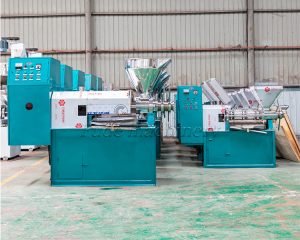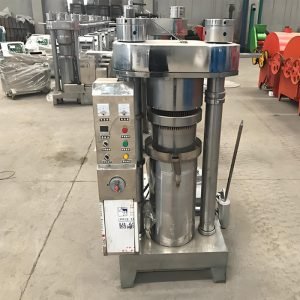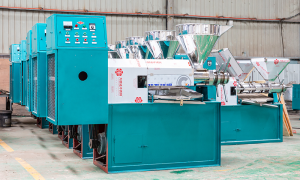What is the Difference Between Cold Pressing and Hot Pressing Flaxseed Oil?
I understand you are thinking about processing flaxseed. Flaxseed oil is very popular. Many people want to make it for health reasons. There are two main ways to get oil from flaxseed. These are cold pressing and hot pressing. Each method changes the oil in different ways. I will explain these to you now. We at Fude Machinery have long history in this field. We have helped many customers with their oil processing needs.
Last Updated: May 2025 | Estimated Reading Time: 12 minutes
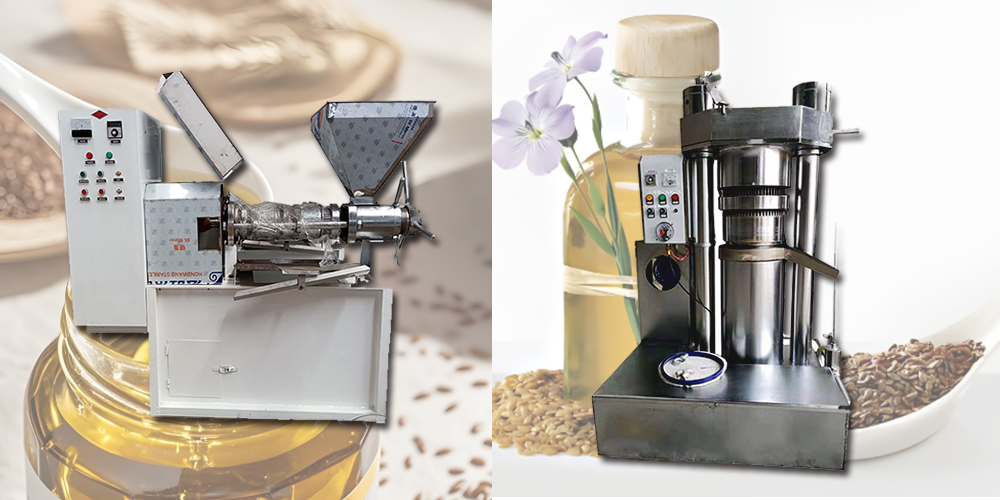
This article will answer your questions:
- What is flaxseed oil cold pressing about?
- How does flaxseed oil hot pressing work?
- What are the main differences between these methods?
- What equipment do you need for flaxseed oil?
- How are flaxseed oil extraction methods changing in 2025?
What is Flaxseed Oil Cold Pressing About?
Cold pressing flaxseed oil means we press the seeds at low temperatures. The temperature usually stays below 60 degrees Celsius. In many cases, it is even lower, around 40 to 50 degrees Celsius. This low heat protects the oil. It helps keep many good things inside the oil. These good things include important nutrients like Omega-3 fatty acids. They also include vitamins and antioxidants. The process starts with clean flaxseeds. We then put them into a specialized machine. This machine applies pressure to squeeze out the oil. No extra heat is added during this step directly. The only heat comes from the friction of the pressing action. We design our single screw oil press machines to minimize this friction, keeping temperatures low. This careful process makes sures the oil stays as natural as possible.
When you cold press flaxseed oil, you get a pure product. The oil keeps its original color and its natural flavor. It has a light, nutty taste. This type of oil is often called “virgin” oil. People like it for salads and for adding to foods without cooking. This is because high heat can harm the Omega-3s. So, using cold-pressed oil for raw food is best. However, there is a trade-off. Cold pressing usually gives you less oil from the same amount of seeds. This means the yield is lower. Also, cold-pressed flaxseed oil can go bad faster. It is more sensitive to light and air. This is because it has many delicate compounds. You need to store it in dark bottles and keep it cool. Our modern cold pressing equipment helps manage these challenges. We ensure the machines are efficient for low-temperature operation.
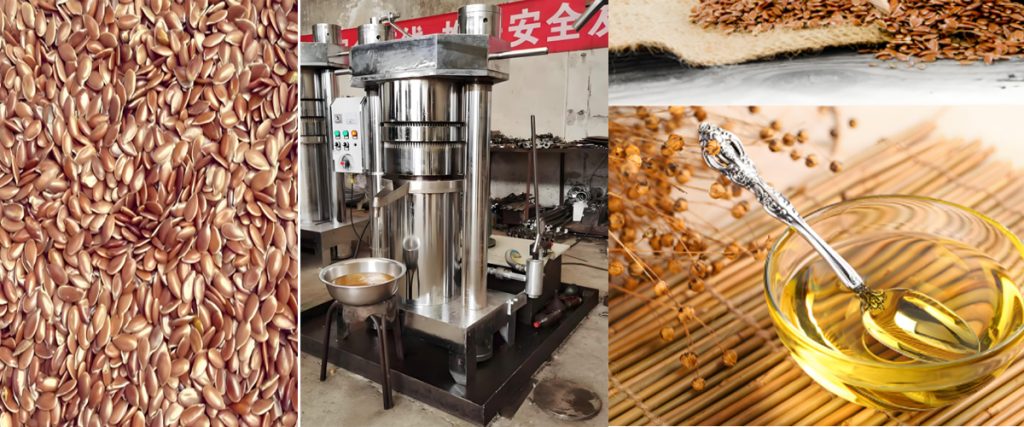
How Does Cold Pressing Protect Nutrients?
Cold pressing protects nutrients by avoiding high heat. High temperatures can break down important parts of the oil. For flaxseed oil, the main concern is Omega-3 alpha-linolenic acid (ALA). ALA is a polyunsaturated fatty acid. It is very sensitive to heat. When exposed to heat, ALA can change its structure. It can also become oxidized. Oxidation is a process where oxygen reacts with fats. This makes the oil taste bad. It also reduces its health benefits. Think of it like cooking a delicate vegetable for too long. It loses its crunch and some vitamins. Cold pressing keeps the temperature down. This means very little damage happens to the ALA. The oil also keeps its natural antioxidants. These antioxidants protect the oil from spoiling. They also offer health benefits when consumed. So, cold pressing makes sure you get the most out of flaxseed’s natural goodness. Our advanced helps you produce high-quality cold-pressed oil.
Practical tips for cold pressing:
- Clean Seeds: Always start with very clean flaxseeds. Dirt can affect oil quality.
- Slow Pressing: Use a machine that can press slowly. This keeps friction heat low.
- Dark Storage: Put the oil in dark, airtight containers right away.
- Cool Place: Store the oil in a refrigerator. This makes it last longer.
- Small Batches: If possible, press smaller amounts more often. This keeps the oil fresh.
Actual Case: One of our customers in a tropical country wanted to produce premium flaxseed oil. They had issues with oil going rancid quickly because of the hot climate. We advised them to use our specialized with an active cooling system. This system kept the oil temperature consistently below 45 degrees Celsius during pressing, even in their warm facility. Their oil’s shelf life doubled. Their customer feedback improved a lot.
What is Flaxseed Oil Hot Pressing Work?
Hot pressing flaxseed oil involves using higher temperatures. This typically means pre-treating the flaxseeds with heat before pressing. We often use a roasting machine or steam cooker for this. The temperature can reach 100 degrees Celsius or more during this pre-treatment. Then, the heated seeds go into a screw oil press. The heat helps break down the cell walls in the seeds. This makes it easier for the oil to come out. Think of it like heating a sponge to make it more pliable. The oil flows out more freely. This method is old. It is used widely for many oilseeds. It works very well for getting a lot of oil from each seed. Many large oil factories use hot pressing. This is because they want to get the most oil possible from their raw materials.
When you hot press flaxseed oil, you get a higher yield. You get more oil from the same amount of seeds compared to cold pressing. This means less waste. It often means lower production costs per liter of oil. Hot-pressed oil usually has a stronger, darker color and a more intense flavor. Sometimes, it can taste a bit toasted. This is due to the heating process. But, the high heat can harm some delicate nutrients. It can reduce the amount of Omega-3 ALA. It also affects other heat-sensitive compounds. So, hot-pressed flaxseed oil might not have all the same health benefits as cold-pressed oil. It is often refined afterwards. Refining removes impurities. It also improves stability. Hot-pressed oil is more stable against oxidation. It lasts longer on the shelf. This makes it good for industrial uses or for cooking purposes where flavor is less of a concern.
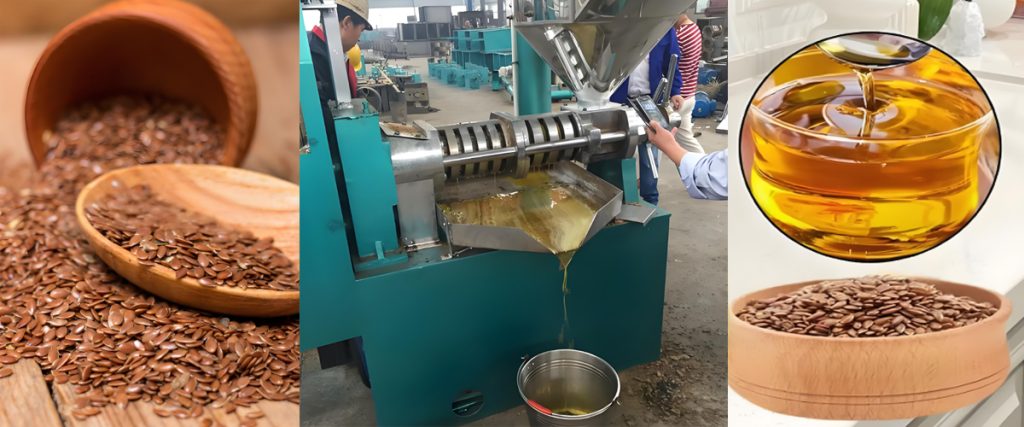
When Should You Consider Hot Pressing for Flaxseed?
You should consider hot pressing for flaxseed when your main goal is high oil yield. This method extracts significantly more oil. It is very useful for large-scale production. If you are a medium to large oil factory, hot pressing can make your operations more cost-effective. The higher extraction rate means you get more product from your raw materials. This helps lower the overall processing cost. Also, if you need oil that is more stable for storage or shipping, hot pressing is a good choice. The heat treatment changes the oil. It makes it less likely to spoil quickly. This is important for products that need a long shelf life. For example, if you are supplying oil for industrial uses or for cooking oil that will be stored for months. While some nutrients are reduced, the oil still has benefits. We can help you find the right and roasting machines for your needs.
Table: Hot Pressing Considerations for Flaxseed
| Topic | Hot Pressing Characteristic | Your Practical Meaning |
|---|---|---|
| Oil Yield | Significantly higher | More liters of oil from same seeds, lower cost per unit |
| Oil Stability | More stable, longer shelf life | Less spoilage, easier storage and transport |
| Nutrient Content | Reduced heat-sensitive nutrients (Omega-3) | May not be ideal for premium health supplement market |
| Flavor/Aroma | Toasted, stronger | Can be perceived as less “pure” or changed from fresh |
| Refining Need | Often requires further refining | Adds processing steps but creates a more neutral product |
User practical tips and advice:
- Yield Focus: If you need to maximize oil output and minimize seed waste, use hot pressing.
- Industrial Use: For applications where Omega-3 content is not the main driver, hot pressing works well.
- Stable Product: If shelf life matters a lot for your distribution, consider hot pressing.
- Integrated Lines: Use our before pressing for best hot pressing results.
Actual Case: A major cooking oil producer in Asia contacted us. They wanted to add flaxseed oil to their blended cooking oils. Their priority was yield and stability for mass production. We designed a complete hot pressing and refining line for them. This included our continuous roasting machines and efficient screw presses. The line helped them achieve over 95% oil extraction efficiency for flaxseed. The oil also passed all stability tests.
How Do Cold Pressing and Hot Pressing Flaxseed Oil Compare?
Comparing cold pressing and hot pressing for flaxseed oil helps you choose the right method. Each method has strong points and weak points. The main difference is the temperature used during extraction. This temperature affects several things. It changes the oil’s quality. It changes the amount of oil you get. It also changes how long the oil stays good. Cold pressing protects delicate nutrients better. Hot pressing gives you more oil. We have machines that can do both. Your choice depends on what you want from your flaxseed oil operation. If you want a health supplement, cold pressing is usually the way to go. If you want a lot of oil for industrial use or general cooking, hot pressing might be better.
| Feature | Cold Pressing Flaxseed Oil | Hot Pressing Flaxseed Oil | Your Business Implication |
|---|---|---|---|
| Temperature | Low (below 60°C, often 40-50°C) | High (pre-heated to 100°C+, pressing still hot) | Affects nutrient content and operational costs significantly |
| Oil Yield | Lower (e.g., 25-30% oil from seeds) | Higher (e.g., 35-40% oil from seeds) | Directly impacts raw material costs and overall profit per batch |
| Nutrient Content | High in Omega-3 ALA, vitamins, antioxidants | Lower Omega-3 ALA, some vitamins degraded | Defines your market: premium health vs. general purpose oil |
| Flavor/Aroma | Light, nutty, natural. Pure. | Stronger, toasted. Sometimes more intense. | Affects consumer preference and use (raw consumption vs. cooking) |
| Shelf Life | Shorter, prone to oxidation. Needs refrigeration. | Longer, more stable. Can be stored at room temp. | Important for distribution, storage, and managing product inventory |
| Color | Lighter, often golden yellow. | Darker, more amber. | Visual appeal for consumers, may require more refining for lighter color |
| Refining Needs | Often used without refining or light filtration only | Often requires full refining (degumming, decolorizing, etc.) | Influences total investment in equipment and processing time. Consider our refining equipment. |
What Equipment Do You Need for Flaxseed Oil Extraction?
You need several types of equipment for flaxseed oil extraction. The exact machines depend on your chosen method. They also depend on how much oil you want to make. We offer a full range of machines for flaxseed oil processing. This includes everything from cleaning the seeds to getting the final oil.
- Pre-treatment Equipment:
- Cleaning Machines: Flaxseeds often contain dust and impurities. You need machines to remove these. This includes screeners and de-stoners. Clean seeds lead to better oil quality.
- Roasting Machines (for hot pressing): If you choose hot pressing, you need a roasting machine. Our(roasting machines) heat the seeds evenly. This prepares them for maximum oil extraction. They ensure good flavor development for hot-pressed oil.
- Drying Equipment (for specific needs): Sometimes, seeds need drying. This reduces moisture content. Lower moisture helps prevent mold. It also improves oil extraction efficiency. We provide suitable drying machines.
- Pressing Equipment:
- Single Screw Oil Press: This is a versatile machine. It works for both cold and hot pressing. For cold pressing, it operates at lower speeds. This keeps friction heat down. For hot pressing, it handles pre-heated seeds very well.
- Hydraulic Oil Press: This machine uses hydraulic power. It is often used for smaller batches or for specific high-value oils. It can achieve very high pressure. This helps extract oil efficiently.
- Filtration Equipment:
- Centrifugal Oil Filter: After pressing, the oil still has some solid particles. A centrifugal filter removes these. It spins the oil at high speeds. This separates the solids.
- Vacuum Oil Filter: This filter uses a vacuum. It pulls the oil through filter cloths. It removes smaller particles more effectively.
- Refining Equipment: For hot-pressed oil, or if you want a purer product, you need refining equipment. This includes units for degumming, deacidification, decolorizing, and deodorization. Our refinery machines can be batch type or continuous type. They produce very high-quality edible oil.
- You can learn more about our [@https://www.fudemachinery.com/oil-refinery-equipment] for various applications.
We can design a complete processing line for you. This includes all these machines linked together. We call this an Oil Mill Plant. These plants are tailored to your needs. They can handle large or small amounts of flaxseeds. We consider your yield goals and quality requirements. Our goal is to give you a one-stop solution. This means you get all the machines you need from one place.
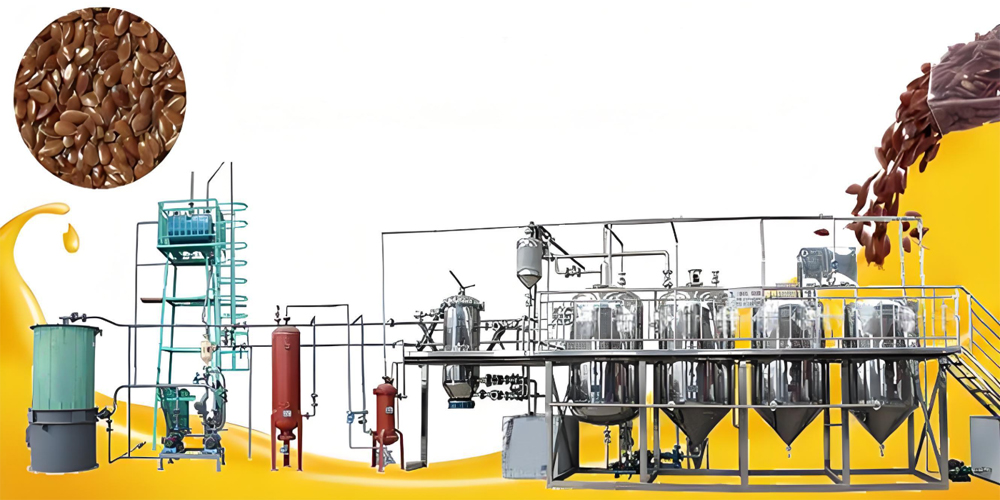
How Are Flaxseed Oil Extraction Methods Evolving in 2025?
The world of flaxseed oil extraction is always changing. New technologies are making things better. In 2025, we see a strong move towards automation and better energy use. This is true for both cold and hot pressing. Companies want to produce more with less effort. They also want to save energy. Machines are becoming smarter. They can control temperatures more accurately. This leads to better oil quality. It also gives more consistent results. There is also a growing demand for specialized equipment. This equipment can handle different types of flaxseeds. Different flaxseed varieties have different oil contents. Precision is very important now. Our research and development team always works on new ideas. We keep our machines up-to-date with the latest trends.
Latest progress in flaxseed oil extraction:
- Smart Temperature Control: New sensors and computer systems precisely manage heat during pressing. This helps preserve nutrients in cold pressing. It optimizes yield in hot pressing.
- Energy-Efficient Motors: Presses now use motors that consume less electricity. This lowers operational costs for you. It also means less impact on the environment.
- Integrated Processing Units: We are designing more compact systems. These systems combine cleaning, pressing, and filtering. They reduce the need for manual work. They also save space in your factory.
Market Insight: The global market for healthy oils like flaxseed oil is getting bigger. More consumers want natural products. They want to know where their food comes from. This drives demand for high-quality, cold-pressed oils. At the same time, industrial demand for stable oils also grows. This creates opportunities for both cold and hot pressing methods. Emerging markets show a very high demand for affordable and reliable extraction solutions. We are well-placed to meet these varying demands. We ship our machines to over 120 countries worldwide.
Common Questions and Answers
Question 1: Which method gives more oil, cold pressing or hot pressing?
Hot pressing generally gives a higher oil yield. It extracts more oil from the same amount of flaxseeds. Cold pressing yields less oil. This is because heat helps release more oil from the seed cells.
Question 2: Does hot pressing destroy all the good parts of flaxseed oil?
Hot pressing reduces the amount of heat-sensitive nutrients. This includes Omega-3 ALA. But, it does not destroy all beneficial compounds. The oil still has other fatty acids and some nutrients. It depends on the specific heat level and time.
Question 3: How long does flaxseed oil last after pressing?
Cold-pressed flaxseed oil lasts less. It typically lasts 3-6 months if kept cold and in a dark bottle. Hot-pressed oil lasts longer. It can last up to a year or more. This is because hot pressing makes it more stable.
Question 4: Can I use the same machine for both cold and hot pressing?
Yes, some machines like our screw oil presses can do both. You would adjust settings for speed and temperature control. For hot pressing, you also need to use a roasting machine before the press.
Question 5: What is the best method for making flaxseed oil for health supplements?
Cold pressing is generally best for health supplements. It preserves the delicate Omega-3 fatty acids. These are the main reason people buy flaxseed oil for health.
Summary and Recommendations
You now understand that making flaxseed oil involves choices. The choice between cold pressing and hot pressing flaxseed oil depends on your goal. Cold pressing gives you high-quality oil. It protects the nutrients. You get a natural product. But, it gives less oil and stores for a shorter time. Hot pressing gives you more oil. It makes the oil more stable. But, it can reduce some nutrients. We offer machines for both methods. We also provide full processing lines.
We suggest you think about what kind of flaxseed oil you want to sell. Do you want a premium health product? Then cold pressing is likely best. Are you looking for high yield and stability for industrial use? Then hot pressing might be better. We can help you decide. We can customize the equipment to fit your exact needs.
About Fude Machinery
We are Fude Machinery. We are a Chinese manufacturer of oil processing equipment. We are in Zhengzhou City. We focus on B2B business. We make many types of equipment. This includes oil extraction machines, drying machines, and refinery machines. We also offer complete oil processing plants. Our factory has 8000 square meters. We can make over 500 machines each year. We have advanced production equipment. We export our products to over 120 countries. We offer full service from design to installation and after-sales support. We make sure you get the best quality machines.
Contact us today. Get a free consultation about your flaxseed oil project. We will help you find the best solution.
Related recommendations
-
What plants are suitable for the spiral oil press to make oil
454Spiral oil press has a wide range of applicability and can press various plant oils to meet the needs of different users
View details -
Is Korean hydraulic oil machine worth buying
535Hydraulic oil press is a device that uses hydraulic principles to extract oil from plant seeds. The extracted oil is pure, fragrant, and healthier, and is chosen by more people.
View details -
Introduction to multifunctional oil press
605Spiral oil press is a multifunctional equipment with the following characteristics: simple structure, small volume, easy maintenance, diverse oil pressing materials, high oil yield, large production capacity, and continuous processing. Sque...
View details -
Which countries are oil presses sold to
608As an important edible oil production equipment, the oil press has sales markets in multiple countries and regions around the world, and regions with oil press raw materials are potential customers for the oil press.
View details
 Oil Press Equipment and Oil Refining Machinery for Sale – Start Your Oil Press Business
Oil Press Equipment and Oil Refining Machinery for Sale – Start Your Oil Press Business
